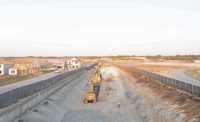A lingering drought and population boom in North Texas have prompted the Wylie-based North Texas Municipal Water District to undertake water-use restrictions while embarking on a $300-million project to build a 48-mile pipeline from Lake Texoma to the 300-million-gallon-per-day Wylie raw water treatment plant, bypassing Sister Grove Creek, a natural tributary of Lavon Lake. The closed pipeline also will prevent any invasive species, including freshwater zebra mussels, from being released into the environment while restoring a major portion of the region's lost water supply.
President Barack Obama signed House Resolution 6007 last December, giving the water utility an exemption from an old federal law that bans transport of "injurious species," such as the zebra mussels, to allow it to resume pumping water once the project is complete in January.
Lake Texoma, a 2.5-million-acre-ft man-made reservoir formed by the Denison Dam on the Red River in Bryan and Grayson counties in Oklahoma and Texas, respectively, is playing a key role in meeting burgeoning water needs in North Texas. The region's municipal water district serves 1.6 million residents across 61 cities, towns, and special utility districts over nine counties, altogether spanning a 2,200-sq-mile area.
Underwater threat
The district draws upon several surrounding lakes to quench its thirst, including Lake Texoma, which provides 28% of its water supply.
Zebra mussels, however, have since emerged and multiplied across the lake—clinging to and clogging water pipes. Raw water intakes can carry the microscopic free-swimming larvae directly into treatment facilities. Under the Lacey Act of 1900, interstate transport of zebra mussels and related nuisance species is a criminal offense with penalties of up to $500,000 for each violation.
As a result, the Army Corps of Engineers, which supervises the lake, ordered the municipal water district in 2009 to stop pumping until it could devise a system that would prevent zebra mussels from spreading from the Red River Basin into Lavon Lake and the Trinity River Basin. The district consequently has been unable to draw 84,000 acre ft of water a year.
"Our primary water supplies are below normal levels due to less than average rainfall," said Jim Parks, the district's executive director, in a statement. "We need to conserve the supplies we have and reduce our water use by at least 10%."
Constructing a Remedy
In September 2011, the district hired Fort Worth-based Freese and Nichols Inc. as design engineer while evaluating more than 20 pipeline alignments and gaining rights-of-way from 300 property owners. Kansas City, Mo.-based Garney Cos. Inc. was tapped as construction manager at-risk in January 2012.








Post a comment to this article
Report Abusive Comment